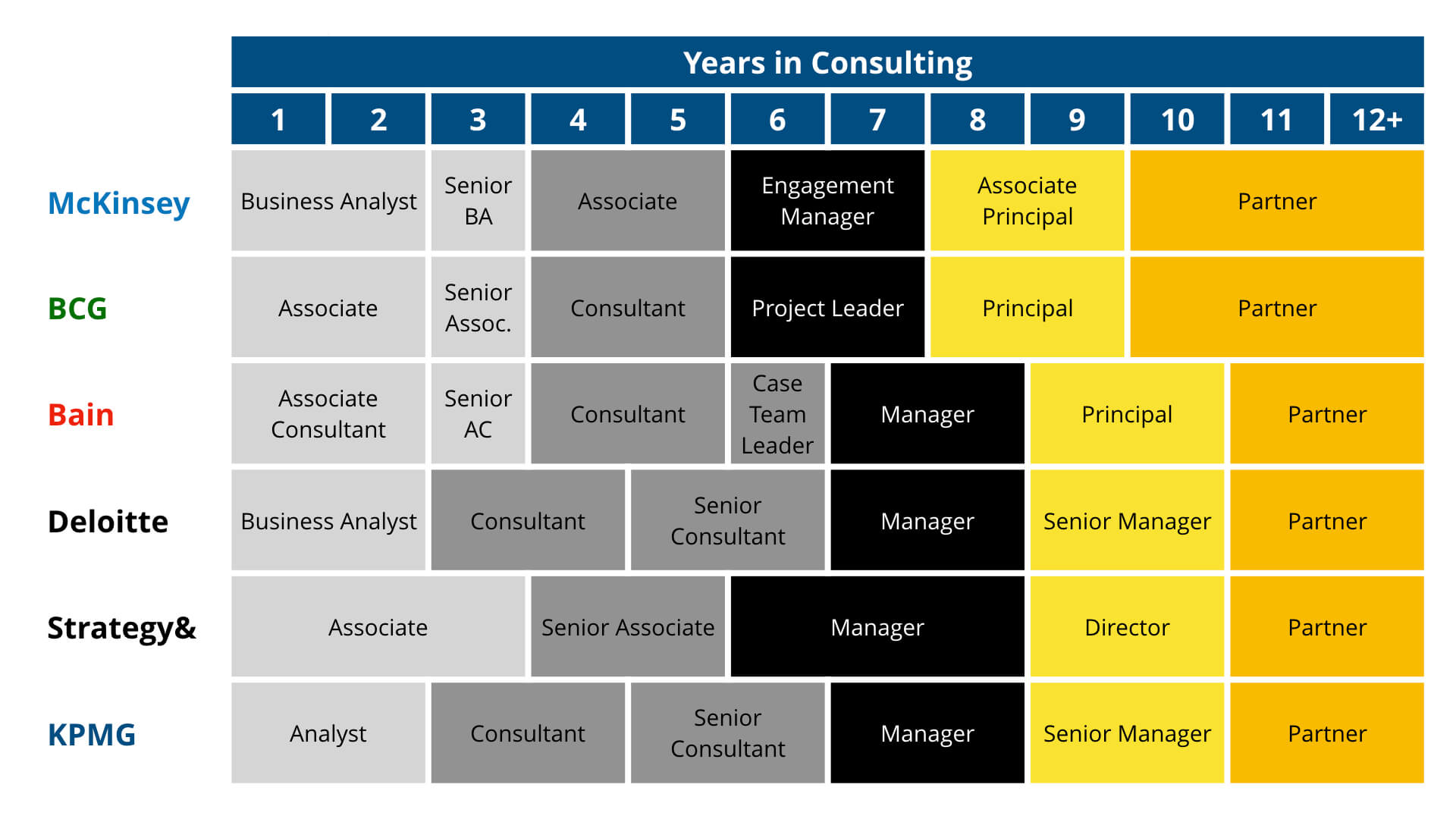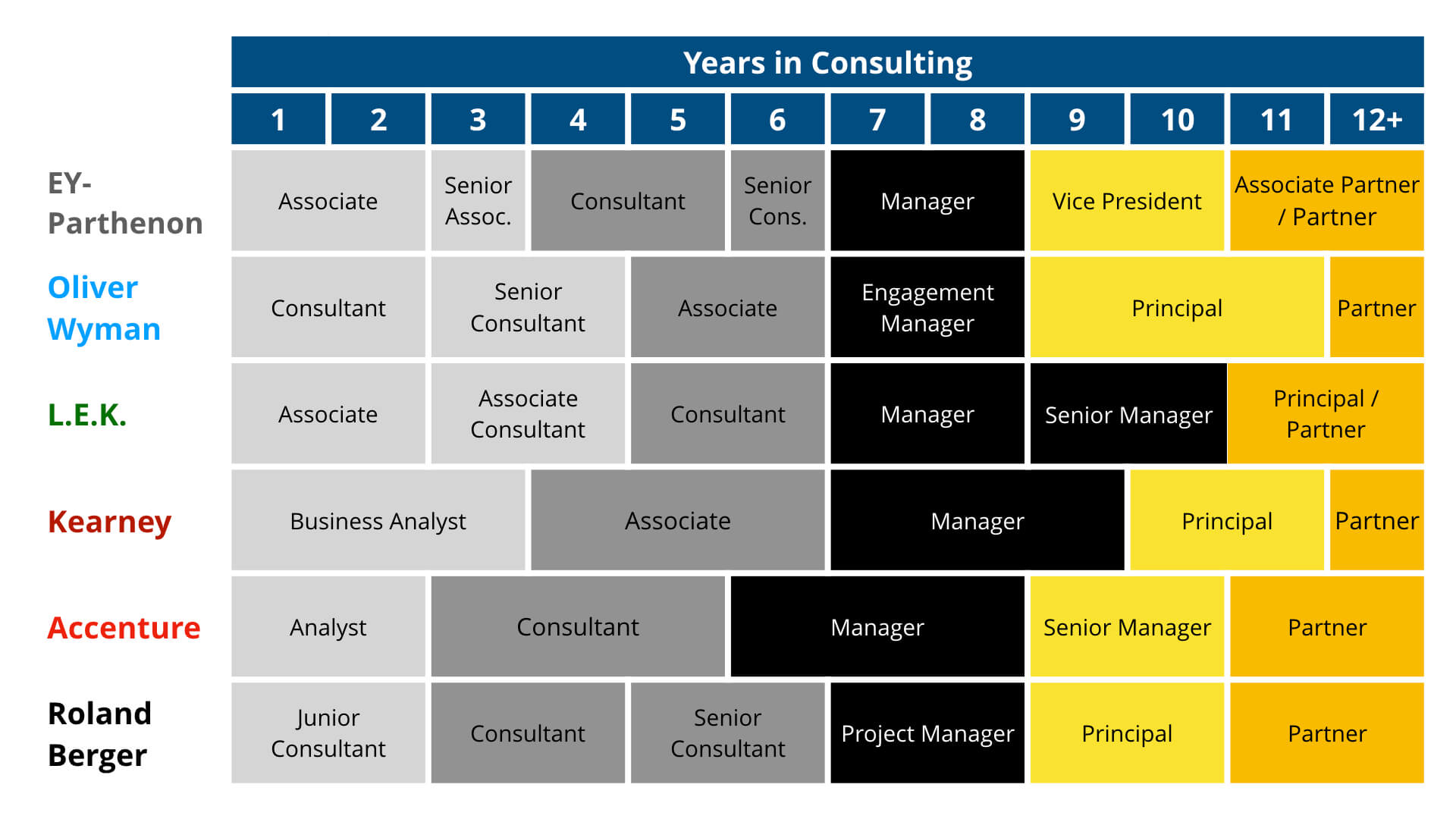Land Multiple Consulting Offers
Complete, step-by-step case interview course.
30,000+ happy customers.

The consulting career path is unlike the career path of many industry jobs. Consulting firms have standardized promotion timelines and schedules. Unlike many industry jobs, you don’t need to wait for a role to become vacant in order to be promoted. There will always be an opportunity for promotion if you are a strong performer.
Additionally, you won’t need to change companies in order to accelerate your career progression. In fact, staying at the same consulting firm is the fastest way to advance your career.
However, this career progression does come at a price. Consulting firms are known for their “up or out” policy. If you do not meet expectations and do not get promoted, you’ll be asked to leave the firm and find another job.
In this article, we’ll go over:
If you’re looking for a step-by-step shortcut to learn case interviews quickly, enroll in our case interview course. These insider strategies from a former Bain interviewer helped 30,000+ land consulting offers while saving hundreds of hours of prep time.
There are seven different entry points into consulting. Some are more common than others.

Undergraduate hire
Consulting firms hire many of their consultants from top-tier undergraduate schools. This entry point represents the largest or second largest hiring pool, depending on the firm. As an undergraduate hire, you’ll enter consulting at the lowest level, the Business Analyst or Associate Consultant role.
In the United States, consulting firms spend most of their resources targeting the top 20 - 25 ranked undergraduate institutions. These include:
If you do not attend a top undergraduate institution, it is still possible to get a job offer at a top-tier consulting firm. However, you’ll need to have an impressive resume and you will need to spend more time and resources on networking to get your foot in the door.
MBA hire
Consulting firms also hire many of their consultants from top-tier MBA schools. This entry point represents the largest or second largest hiring pool, depending on the firm. As an MBA hire, you’ll join at the Consultant or Associate level, bypassing the 2 – 3 years of consulting that undergraduate hires go through to reach the same level.
In the United States, consulting firms spend most of their resources targeting the top 15 – 20 ranked business schools. These include:
Again, If you do not attend a top business school, it is still possible to get a job offer at a top-tier consulting firm if you have an impressive resume and network well.
Non-MBA master’s degree hire
Non-MBA master’s degree hires are much less common than undergraduate or MBA hires.
Consulting firms do not have a special recruiting process for this type of candidate, so they often recruit these candidates from the same schools that they recruit undergraduate hires from.
As a non-MBA master’s degree hire, you’ll typically enter consulting at the same level as undergraduate hires, at the Business Analyst or Associate Consultant level.
Advanced degree hire
Advanced degree hires are candidates that will have completed their PhD, MD, or JD degree. Consulting firms typically have special recruiting processes to make it easier for these candidates to apply and transition to consulting. Consulting firms recruit these candidates from the same schools that they recruit undergraduate and MBA hires from.
As an advanced degree hire, you’ll enter consulting at the same level that MBA hires enter, at the Consultant or Associate level.
If you are a PhD or advanced degree holder and are trying to break into consulting, we have a step-by-step guide on breaking into consulting as a PhD / advanced degree holder.
Early industry hire
In general, industry hires are not common for consulting firms. However, early industry hires are more common than later stages of industry hires.
Early industry hires typically have 1 – 2 years of work experience when they apply and get hired by consulting firms. As an early industry hire, you’ll enter consulting at the lowest level, the Business Analyst or Associate Consultant level.
Experienced industry hire
If you are a working professional with 4 – 7 years of work experience, you may be able to enter consulting at the Consultant or Associate level, the same level that MBA and advanced degree hires enter. This would let you skip the 2 – 3 years of consulting that undergraduates go through to reach the same level.
However, this type of hiring is quite rare.
Executive industry hire
If you have over 10 years of work experience, you may get hired at a much higher consulting level such as Principal or Partner. Consulting firms make very few industry hires at this level.
Usually, the consulting firm must have a very strong reason for hiring someone directly to the Partner level. These executive industry hires typically have expertise that the firm desperately needs or they have valuable connections that would help the firm sell consulting work.
There are five major steps on the consulting career path. What you do day to day changes drastically as you move through these steps. Each role or tenure has their own unique activities and responsibilities.

1. Junior Consultants
Junior consultants are the workhorses of any consulting team. They are responsible for researching information, gathering data, analyzing data, and making PowerPoint slides.
Specific tasks may include:
Junior consultants are more involved in the execution of tasks rather than strategic planning. They typically report to senior consultants and support them on their workstreams. They also have less involvement in client relationship management and limited exposure to Partners.
Junior consultants are typically generalists, not specializing in a particular industry or function. It typically takes 2 – 3 years to get promoted to the next level.
2. Senior Consultants
Senior consultants do all of the work that junior consultants do. However, they typically own their own workstream. This means that they oversee the planning and process of their work in addition to the execution.
Senior consultants also have the responsibility of managing a junior consultant. They will supervise their work and provide direction and guidance to them. They will also be responsible for managing relationships with junior level clients.
Senior consultants typically report to managers. They will also be more involved in team discussions with partners.
Senior consultants are still generalists, but may begin to specialize in a particular industry or function. It typically takes 2 – 3 years to get promoted to the next level.
3. Managers
Managers manage the work of the entire consulting project. They are responsible for ensuring that the consulting project is on track.
Managers will rarely do any research, data gathering, or data analysis. Instead, they focus on:
Managers report to the principals or partners that oversee the project. They also indirectly report to the primary client stakeholders that purchased the consulting project.
Managers typically have developed expertise and specialization in a particular industry or function. It typically takes 2 - 3 years to get promoted to the next level.
4. Principals
Principals are partners in training. They have two primary roles. First, they are responsible for overseeing the delivery of consulting projects. While managers are responsible for managing the progress of one consulting project, principals may be overseeing two or three different projects. They provide feedback and guidance to the managers of the different projects they oversee.
Additionally, principals also help sell consulting work. They work with partners to put together project proposals and build relationships with potential clients. By this point in their career, principals have committed to specialize in a particular industry or function.
It typically takes 2 - 3 years to get promoted to the next level. A huge decision factor is the ability to sell consulting work.
5. Partners
Partners have usually been at the consulting firm for over ten years and oversee a portfolio of different consulting projects. They are not involved in the day-to-day planning and execution of projects, but will still provide feedback and guidance to their teams when needed.
Partners focus most of their time on selling new consulting projects and retaining existing clients. Much of their job is relationship building. They also have deep expertise in a particular industry or function, which helps them sell consulting work.
Consulting job titles differ significantly across firms. Each consulting firm has their own naming system for their different roles and levels.


One of the benefits of consulting is the wide range of potential exit opportunities. Below are some examples of exit opportunities at each consulting level.
Learn Case Interviews 10x Faster
Here are the resources we recommend to learn the most robust, effective case interview strategies in the least time-consuming way: